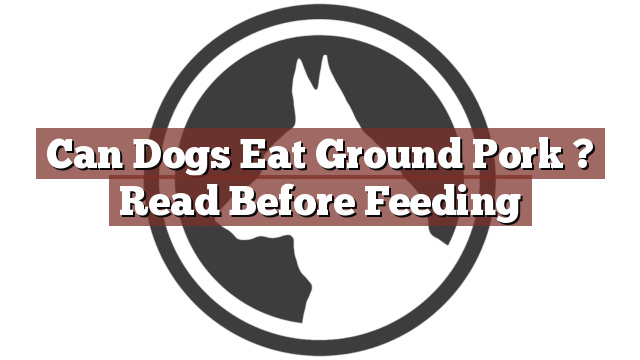Understanding Your Dog’s Dietary Needs
As responsible pet owners, it is crucial to understand our dog’s dietary needs to ensure their overall health and well-being. Dogs are omnivores, meaning they can eat both meat and plant-based foods. However, their diets should primarily consist of high-quality protein sources, along with essential fats, carbohydrates, vitamins, and minerals. Providing a balanced diet is essential to support their growth, energy levels, and immune system.
Can Dogs Eat Ground Pork? Read Before Feeding
Can dogs eat ground pork? The answer is yes, but it should be done with caution. Ground pork can be a suitable addition to your dog’s diet as long as it is cooked thoroughly and served in moderation. Raw or undercooked pork can pose health risks to dogs due to the potential presence of parasites or bacteria like salmonella or trichinella. These can cause serious digestive issues and even lead to food poisoning.
It is essential to note that while pork is not toxic to dogs, it should not become a staple in their diet. Dogs require a balanced diet that includes a variety of proteins, such as chicken, beef, and fish, along with other nutrient-rich foods like vegetables and grains.
Pros and Cons of Feeding Ground Pork to Dogs
Feeding ground pork to your dog can have its advantages and disadvantages. On the positive side, pork is a good source of protein, iron, and zinc, which are essential for muscle development and overall immune function. It is also a great alternative protein source for dogs with allergies or sensitivities to other meats. Additionally, ground pork can provide some variety in your dog’s diet, keeping mealtime exciting for them.
However, there are a few drawbacks to consider. Pork is generally higher in fat compared to other meats, so it may not be suitable for dogs that are prone to weight gain or have pancreatic issues. Also, some dogs may experience digestive upset or allergies when introduced to pork for the first time. Always monitor your dog for any adverse reactions after feeding them ground pork.
Conclusion: Considerations for Feeding Ground Pork to Your Dog
In conclusion, dogs can eat ground pork, but it should be given in moderation and prepared properly. Cook the pork thoroughly to eliminate any potential health risks associated with raw or undercooked meat. Remember, pork should not replace the primary sources of protein in your dog’s diet, and it is crucial to maintain a balanced and varied meal plan for your furry friend. If you are unsure about introducing pork or any new food into your dog’s diet, consult with your veterinarian to ensure their nutritional needs are met and to address any specific concerns or allergies your dog may have.
Thank you for taking the time to read through our exploration of [page_title]. As every dog lover knows, our furry friends have unique dietary needs and responses, often varying from one canine to another. This is why it's paramount to approach any changes in their diet with caution and knowledge.
Before introducing any new treats or making alterations to your dog's diet based on our insights, it's crucial to consult with a veterinarian about [page_title]. Their expertise ensures that the choices you make are well-suited to your particular pet's health and well-being.
Even seemingly harmless foods can sometimes lead to allergic reactions or digestive issues, which is why monitoring your dog after introducing any new food item is essential.
The content provided here on [page_title] is crafted with care, thorough research, and a genuine love for dogs. Nevertheless, it serves as a general guideline and should not be considered a substitute for professional veterinary advice.
Always prioritize the expert insights of your veterinarian, and remember that the health and happiness of your furry companion come first.
May your journey with your pet continue to be filled with joy, love, and safe culinary adventures. Happy reading, and even happier snacking for your canine friend!

